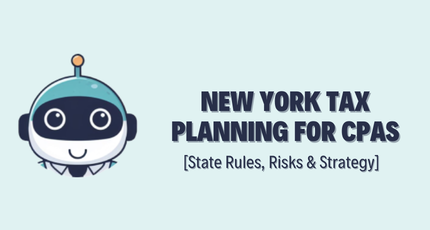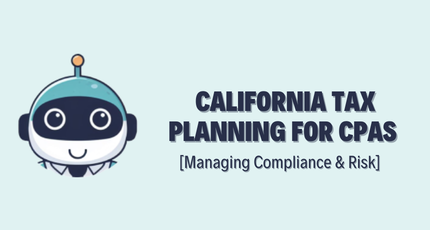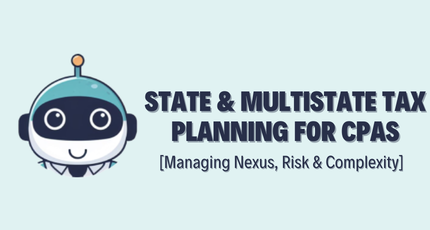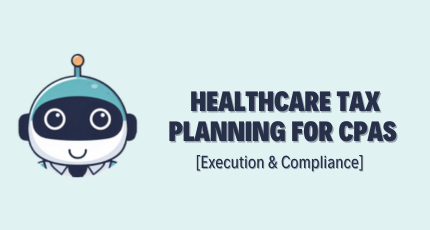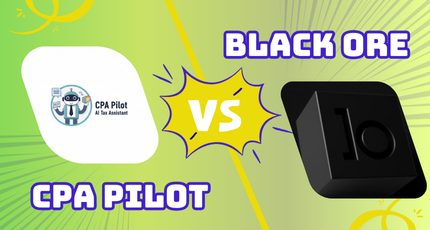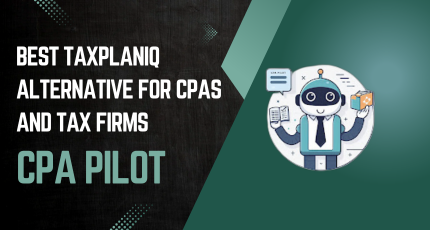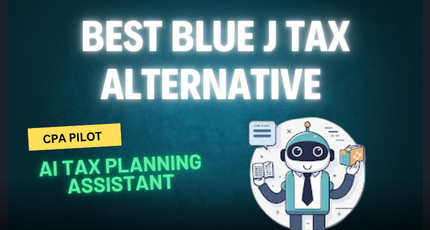CPA Pilot vs TaxGPT vs ChatGPT: Best AI Assistant For Tax Planning [2026]
![CPA Pilot vs TaxGPT vs ChatGPT: Best AI Assistant For Tax Planning [2026]](https://www.cpapilot.com/blog/wp-content/uploads/2025/09/ChatGPT-vs-TaxGPT-vs-CPA-Pilot-Comparison.png)
[Last Updated on 4 weeks ago]
Artificial intelligence is transforming the accounting and tax industry. From research assistants to full-practice platforms, firms have more AI tools than ever before. But with choice comes confusion: how do you know which is the best AI tax planning tool for CPAs?
Table of Contents
- Why Compare ChatGPT, TaxGPT, and CPA Pilot?
- What is ChatGPT?
- What is TaxGPT?
- What is CPA Pilot?
- Unique Advantages of CPA Pilot Over TaxGPT & ChatGPT
- Why Tax Firms Should Choose CPA Pilot Over Other AI Tax Assistants?
- CPA Pilot vs ChatGPT vs TaxGPT: Feature Comparison
- Real-World Q&A: CPA Pilot vs TaxGPT vs ChatGPT
- Which AI Tool Should You Use for Tax Planning?
- 📌 Final Takeaway
- FAQs: CPA Pilot vs ChatGPT vs TaxGPT
Why Compare ChatGPT, TaxGPT, and CPA Pilot?
Tax professionals are under more pressure than ever before. Seasonal overload, complex IRS and state regulations, staff shortages, and high client expectations have made tax practices harder to manage.
That’s why many CPAs and tax advisors are turning to AI tools to save time and improve accuracy. But not all AI tools are built the same:
- ChatGPT is a general-purpose AI that can generate text but isn’t trained on tax-specific rules.
- TaxGPT is positioned as a tax-focused AI but is limited to certain use cases like planning and ROI analysis.
- CPA Pilot is designed by CPAs, for CPAs — offering end-to-end AI support for research, planning, communication, and staff training.
In this article, we’ll compare ChatGPT vs TaxGPT vs CPA Pilot to help you decide which tool is right for your tax practice.
What is ChatGPT?
ChatGPT, developed by OpenAI, is a general-purpose AI chatbot that can generate natural language responses across almost any topic. Many CPAs experiment with it for:
- Drafting emails
- Summarizing documents
- Answering basic client questions
But when it comes to tax practice, ChatGPT shows significant limitations:
- No authoritative IRS citations → answers may lack compliance.
- High risk of “hallucinations” → generating wrong or misleading tax information.
- No tax software integration → cannot directly support Drake, Lacerte, UltraTax, etc.
- Not designed for CPAs → requires heavy prompt engineering and manual review.
✅ Strategic Difference: CPA Pilot vs ChatGPT
- CPA Pilot is purpose-built for tax professionals, trained on IRS and state tax codes, form instructions, and authoritative sources.
- While ChatGPT requires manual verification, CPA Pilot cites IRS publications, tax codes, and form instructions in every answer.
- CPA Pilot adds CPA-centric workflows like drafting IRS notice responses, automating client communication, and supporting tax software.
👉 In short: ChatGPT is a general AI tool, while CPA Pilot is a specialized AI tax assistant that delivers compliance and accuracy out of the box.
What is TaxGPT?
TaxGPT is marketed as an AI-driven tax planning assistant. Its main strength lies in analyzing bulk 1040 data, generating ROI-focused recommendations, and producing client-ready tax plans in minutes.
Key features include:
- Automated analysis of mass tax return data
- ROI-based tax strategy suggestions
- Quick turnaround for generating tax planning deliverables
However, TaxGPT has clear limitations for CPAs and firms:
- Narrow focus → designed primarily for 1040 analysis, not full practice support
- No client communication tools → can’t draft emails, notices, or memos
- Lacks staff training features → no onboarding or SOP generation for teams
- Enterprise-style pricing → often cost-prohibitive for smaller CPA firms
✅ Strategic Difference: CPA Pilot vs TaxGPT
- CPA Pilot covers all aspects of a tax practice: planning, communication, marketing, staff training, and tax software support.
- Unlike TaxGPT, CPA Pilot provides IRS + state-cited answers with legal sources for added compliance.
- CPA Pilot is more affordable and scalable — with plans starting at $19/month, making it accessible to solo CPAs, small practices, and enterprise firms alike.
👉 In short: TaxGPT helps with ROI-driven planning, while CPA Pilot helps you run your entire practice smarter and faster.
What is CPA Pilot?
CPA Pilot is an AI-powered assistant built specifically for CPAs, EAs, and tax professionals. Unlike general AI chatbots or planning-only tools, CPA Pilot is designed to support every part of the tax workflow.
Key features include:
- Tax Research & Strategy: IRS + state code research with authoritative citations
- Client Communication: Draft emails, IRS notice responses, and client memos in minutes
- Staff Training: Generate SOPs, train staff, and answer team questions instantly
- Tax Software Support: Built-in documentation for Drake, Lacerte, UltraTax, ProSeries, ProConnect, and QuickBooks Online
- Marketing Automation: Create newsletters, blog drafts, and client content in seconds
- Scalable Pricing: Flexible plans starting at $19/month with rollover credits
Unique Advantages of CPA Pilot Over TaxGPT & ChatGPT
1. All-in-One Platform
- Most competitors focus narrowly on tax prep automation (Black Ore, Filed) or research/review (TaxGPT, Juno).
- CPA Pilot integrates tax research + planning + projections + secure file sharing + email automation + marketing tools.
- This means firms don’t need to juggle multiple point solutions – CPA Pilot is a practice hub rather than just a compliance tool.
2. Client Relationship & Growth Tools
- Various tax assistants like TaxGPT, Black Ore, Filed, Juno are designed mainly for internal efficiency.
- CPA Pilot goes further with email integration, CRM-style communication, and marketing automation (e.g., newsletters, deadline reminders, client nurture campaigns).
- This helps firms retain clients and grow revenue, not just save time on tax returns.
3. Human-in-the-Loop Trust
- Some tools pitch “AI autopilot” which can feel risky for CPAs.
- CPA Pilot is built as a co-pilot: AI does heavy lifting (research, projections, draft comms), but CPAs review and approve with full transparency (citations, editable outputs).
- This builds confidence and reduces liability while still delivering efficiency gains.
4. Broader Use Cases
- TaxGPT is powerful for research, but doesn’t handle projections, marketing, or secure file portals.
- Black Ore & Filed focus on 1040 automation, less so on business tax or client comms.
- CPA Pilot covers:
- Research with authoritative citations.
- Tax return reviews with client-uploaded files.
- Projections & planning for advisory.
- Client engagement (emails, marketing, automation).
5. Security & Compliance Emphasis
- CPA Pilot can differentiate with SOC 2 compliance, encrypted file handling, and a clear AI ethics/data policy.
- Many early-stage competitors are still earning trust in this area. CPA Pilot can win over cautious firms by being the “secure choice.”

Why Tax Firms Should Choose CPA Pilot Over Other AI Tax Assistants?
- They want one platform to manage both tax work and client growth.
- They value trusted AI that keeps them in control rather than black-box automation.
- They need tools beyond compliance – like secure portals, planning, and marketing – to scale advisory services.
- They’re concerned about data security and client trust and want a vendor that emphasizes compliance.
✅ Strategic Difference: CPA Pilot vs ChatGPT & TaxGPT
- Compared to ChatGPT: CPA Pilot eliminates hallucinations by citing IRS sources, designed exclusively for tax professionals.
- Compared to TaxGPT: CPA Pilot is more than planning — it’s a full-practice AI assistant that saves 5+ hours per week across research, communication, and training.
- Bottom line: CPA Pilot isn’t just another AI tool. It’s the only AI platform built to empower tax practices end-to-end.
CPA Pilot vs ChatGPT vs TaxGPT: Feature Comparison
| Feature / Capability | ChatGPT | TaxGPT | CPA Pilot |
| Primary Focus | General-purpose AI | 1040 tax planning & ROI analysis | Full AI assistant for CPAs & firms |
| Accuracy & IRS Citations | ❌ No citations, prone to errors | ❌ Limited, no authoritative sourcing | ✅ 95–99% accuracy, IRS & state citations |
| Tax Planning | ❌ Generic suggestions | ✅ ROI-focused tax planning | ✅ Comprehensive planning with authoritative sources |
| Client Communication Tools | ❌ Not available | ❌ Not available | ✅ Drafts emails, notices, memos |
| Staff Training & Onboarding | ❌ Not available | ❌ Not available | ✅ SOPs, staff Q&A, onboarding support |
| Tax Software Support (Drake, Lacerte, etc.) | ❌ None | ❌ None | ✅ Built-in support documentation |
| Pricing Model | ✅ Free & paid tiers | 💲 Enterprise pricing | ✅ Flexible plans from $19/month |
| Best For | General users | ROI-focused CPA firms | CPAs, EAs, and tax practices of all sizes |
This table highlights a critical takeaway: ChatGPT is too broad, TaxGPT is too narrow, but CPA Pilot is built for the full spectrum of CPA workflows.
Real-World Q&A: CPA Pilot vs TaxGPT vs ChatGPT
1. What Are My Options to Reduce My Adjusted Gross Income (AGI)?
TaxGPT Answer (Review: General but partial):Gives a list: contribute to 401(k), traditional IRA; claims some deductions; suggests HSAs and maybe some itemized deductions. But some suggestions are generic and don’t stipulate eligibility, phase-outs, or recent law changes.
ChatGPT Answer (Review: Outdated / Lacking Specifics):Mentioned pre-2024 IRA deduction rules, some standard deduction discussion, but doesn’t always reflect the most current AGI threshold limits; sometimes misses state/phase-out caveats.
CPA Pilot Answer (Accurate & Tailored):
- Lists all the common deduction vehicles: employer retirement contributions, traditional IRA (if not covered by employer plan and income limits apply), HSA contributions, student loan interest (if eligible), etc.
- Explains phase-out ranges and recent adjustments (e.g. for MAGI limits).
- Includes references to the relevant IRS forms & publications.
Verdict:
- TaxGPT: Good general guidance but may leave out key eligibility or recent limit changes.
- ChatGPT: Some suggestions may be based on older rules; risk of applying outdated thresholds.
- CPA Pilot: Gives precise, IRS-backed details, helps user know exactly what applies to their situation.
👉 Why CPA Pilot Wins: Because accurate tax planning demands up-to-date eligibility & thresholds, not just generic advice.
2. How Do I Determine If I Should Itemize Deductions or Take the Standard Deduction?
TaxGPT Answer (Review: Mixed):Points out standard deduction vs itemizing; lists common itemizable deductions (mortgage interest, state taxes, charitable giving), but doesn’t compute comparative benefit or consider state/local tax changes.
ChatGPT Answer (Review: Simplified):Explains the concept, gives typical thresholds; but may use outdated volume amounts (e.g. older SALT deduction caps) or omit recent inflation adjustments or state law changes.
CPA Pilot Answer (Accurate & Context-Sensitive):
- Compares standard deduction vs itemizing using user’s approximate numbers.
- Ensures it includes the current SALT cap, mortgage interest limits, charitable contribution rules (especially for 2026).
- Refers to IRS Form 1040 Schedule A and other relevant instructions.
Verdict:
- TaxGPT: Helpful but might obscure whether itemizing actually yields advantage given your numbers.
- ChatGPT: Good overview but risk of missing recent legislative changes.
- CPA Pilot: Helps do side-by-side comparison, tailored, current law, actionable.
👉 Why CPA Pilot Wins: Makes decision based on your inputs + up-to-date law, not generic estimations.
3. Are There Tax Benefits for Energy-Efficient Home Installations Available in 2026?
TaxGPT Answer (Review: Up-dated but high level):Mentions the Energy Efficient Home Improvement Credit from recent law; gives percent credit, some eligible equipment, perhaps says “check ENERGY STAR”.
ChatGPT Answer (Review: Possibly outdated or missing limits):Might refer to previous limits or older versions of the law, possibly miss that certain sub-limits or eligibility criteria have changed (e.g. income caps, or what qualifies).
CPA Pilot Answer (Accurate & Timely):
- Clearly states the credit(s) under current law (e.g. Inflation Reduction Act / One Big Beautiful Bill or similar URGENT updates).
- Gives amount (e.g. percent of cost, cap limits), criteria (what equipment qualifies, ENERGY STAR etc.), how to claim (which IRS form / documentation).
Verdict:
- TaxGPT: Valuable and fairly updated, but may leave out fine print.
- ChatGPT: Risk of giving older information or missing sub-limits.
- CPA Pilot: Provides current eligibility, limits, and step-by-step claim process.
👉 Why CPA Pilot Wins: Because in tax credits like these, the details matter — wrong info can mean claim denied.
4. Can I Use Tax Loss Harvesting, and What Limitations Apply?
TaxGPT Answer (Review: Good concept, light on limitations):Explains that you can sell investments at a loss to offset capital gains, possibly carry over excess losses, maybe mentions the $3,000 limit for ordinary income.
ChatGPT Answer (Review: Some errors / omissions):Might misstate wash sale rules, omit carryover rules, or give incorrect examples.
CPA Pilot Answer (Accurate & Detailed):
- Explains how capital losses offset capital gains, the carryover rules for excess losses into future years.
- Clarifies wash sale rules, and whether they apply (for securities, not for all assets etc.).
- Gives IRS guidance or publications (e.g., which IRS regs handle wash sales and capital loss carryovers).
Verdict:
- TaxGPT: Good starting point, but may not cover every limitation.
- ChatGPT: Risk of mistake especially in wash sale or carryover rules.
- CPA Pilot: Accurate, covers limitations + possible traps + how to practically apply.
👉 Why CPA Pilot Wins: Because for strategies like loss harvesting, missing a rule can cost money or trigger unwanted tax outcomes.
5. How Do Changes to Filing Status, Dependents, or Life Events (Marriage, Divorce, Birth) Impact My Tax Liability?
TaxGPT Answer (Review: Semi-contextual):Acknowledges that filing status affects standard deduction, tax brackets; dependents affect credits; suggests reviewing W-4 etc.
ChatGPT Answer (Review: Generic):Gives the basics (e.g. married filing jointly vs single vs head of household), maybe mentions child tax credit; sometimes uses outdated credit amounts.
CPA Pilot Answer (Accurate & Personalized):
- Lays out how each filing status works, recent standard deduction for each, how life events (marriage, divorce, birth) change credit/deduction eligibility.
- Explains dependent tests (age, support, residency).
- Ties back to IRS publications or forms.
Verdict:
- TaxGPT: Strong overview but may miss new thresholds or subtleties.
- ChatGPT: Basic info but risk of being outdated, missing specific numbers.
- CPA Pilot: Gives current numbers, full rules, and helps you apply to your situation.
👉 Why CPA Pilot Wins: Because changes in filing status or life events often have large tax implications — need precision, not generic answers.
Which AI Tool Should You Use for Tax Planning?
The best AI tool for you depends on your needs:
Use ChatGPT if:
- You need a general-purpose AI assistant for drafting, summarizing, or brainstorming.
- Tax compliance isn’t critical (e.g., marketing copy, generic client letters).
Use TaxGPT if:
- Your firm focuses heavily on 1040 analysis and ROI-driven planning.
- You don’t need client communication tools or staff training.
- Budget isn’t a concern (enterprise-level pricing).
Use CPA Pilot if:
- You want an AI assistant that supports your entire tax practice.
- You need IRS + state-cited answers for compliance and accuracy.
- You value workflow automation for emails, notices, memos, and staff training.
- You want affordable, flexible pricing that scales with your firm.
📌 Final Takeaway
- ChatGPT = too generic, risky for compliance.
- TaxGPT = good at 1040 planning, but limited.
- CPA Pilot = the only all-in-one AI tax assistant built to support CPAs, EAs, and tax firms across research, planning, communication, and staff training.
👉 Ready to streamline your tax practice? Explore CPA Pilot Plans →
FAQs: CPA Pilot vs ChatGPT vs TaxGPT
Is CPA Pilot better than ChatGPT for tax research?
Yes. While ChatGPT is a general-purpose AI, it is not trained specifically on IRS tax law and often produces incorrect or incomplete answers. CPA Pilot, on the other hand, is trained on IRS publications, tax codes, and state-level regulations, ensuring answers are authoritative and cited.
Can CPA Pilot replace TaxGPT?
Yes. TaxGPT focuses mainly on 1040 analysis and ROI-driven planning, but it doesn’t support client communication, staff training, or tax software integration. CPA Pilot covers everything TaxGPT does — plus IRS-cited research, client-ready communication, and full-practice automation.
Which AI tool is most accurate for CPAs?
CPA Pilot is the most accurate AI tax assistant for CPAs.
- ChatGPT lacks citations and compliance safeguards.
- TaxGPT provides planning insights but without comprehensive authoritative sourcing.
- CPA Pilot consistently delivers 95–99% accuracy, citing IRS and state tax codes to build compliance-ready answers.
Is CPA Pilot more affordable than TaxGPT?
Yes. TaxGPT uses enterprise-level pricing, which can be cost-prohibitive for smaller firms. CPA Pilot starts at just $19/month per user, with rollover credits and scalable plans — making it accessible to solo CPAs, small practices, and large firms.
Can CPA Pilot help with client communication?
Absolutely. Unlike ChatGPT and TaxGPT, CPA Pilot drafts professional emails, IRS notice responses, memos, and client updates in seconds. This feature alone saves tax pros 5+ hours a week and helps improve client satisfaction.
Does CPA Pilot support tax software like Drake or Lacerte?
Yes. CPA Pilot includes built-in support documentation for major tax software like Drake, Lacerte, UltraTax, ProSeries, ProConnect, and QuickBooks Online. This gives firms instant technical support without spending hours searching online.
Is CPA Pilot secure and compliant for CPAs?
Yes. Security and compliance are core to CPA Pilot’s mission. It uses vetted authoritative sources, is designed with SOC 2 compliance in mind, and updates regularly to reflect IRS and state tax law changes.
Disclaimer: This article is provided by CPA Pilot for educational purposes. While we may offer tax software/services, the information here is general and may not address your specific facts and circumstances. It does not constitute individual tax, legal, or accounting advice. U.S. federal and State Tax laws change frequently; please consult a qualified tax professional before acting on any information.

